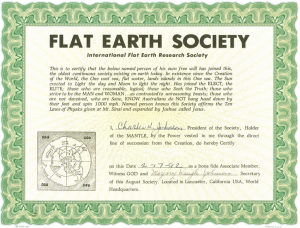 There is a small minority that makes heartfelt arguments that the Earth is flat. Do they deserve half of the news coverage related to global geography? Two maps in every story?
There is a small minority that makes heartfelt arguments that the Earth is flat. Do they deserve half of the news coverage related to global geography? Two maps in every story?
Likewise, there is a small minority that argues humans with a certain skin pigmentation are superior to people with different pigmentation. Do they deserve half of the news coverage about race-related issues?
There also is a small minority that claims the moon landing was a hoax. Did they deserve half of the coverage of moon landings?
In all of these cases, giving minority viewpoints roughly half of the news coverage would have created a false impression that scientists are roughly evenly split about the shape of the planet, the inferiority of some skin colors and the feasibility of space travel. This kind of reporting would have been promoting things that nearly all scientists have proven to be false.
Which brings us to climate change. This week, the British Broadcasting Corporation (BBC) Trust recommended that BBC reporters no longer give equal time to the small minority of scientists who contend that climate change is not happening and/or is not impacted by human activity. A BBC Trust report recommends:
The Trust wishes to emphasise the importance of attempting to establish where the weight of scientific agreement may be found and make that clear to audiences. The BBC has a duty to reflect the weight of scientific agreement but it should also reflect the existence of critical views appropriately. Audiences should be able to understand from the context and clarity of the BBC’s output what weight to give to critical voices.
So, at a time when 97% of climate scientists have found that climate change is happening and is aggravated by human activities, half of the news coverage should not be dedicated to the viewpoint of the 3% of scientists who disagree.
Despite the increasingly lopsided scientific consensus on climate change, a 2013 report done by Media Matters found that half of print news outlets used a false balance approach to climate change reporting. On Fox News, 69 percent of guests cast doubt on the science. On CBS news, in reporting about a rigorous United Nations scientific report, climate change deniers were given more than six times their representation in the scientific community.
The BBC Trust is politely telling its reporters to knock it off. It is telling them to make sure their reporting reflects the reality of broad scientific consensus on climate change.
It’s time for Minnesota’s most thoughtful journalism leaders to follow suit. Star Tribune? MinnPost? Minnesota Public Radio?
– Loveland

The BBC is of course taking heat from such noted climatologists as the Power Line lawyers, who I mention only because all of them spent some time on college campuses and should have a higher regard for science than the average Second Amendment rube oiling his rifles on the stoop of his Pahrump trailer.
Essentially, main stream news organizations are not inclined to risk “controversy”, which means that in this and a few other highly politicized “debates” they apply the hoary journalistic tenet of “balance” to their “reporting”. As has been noted repeatedly local TV weather forecasters are notorious for completely ignoring the … fact …. of climate change.
On a related note I caught a WCCO-TV story the other day, following up on some basic reporting they had done on a Good Samaritan who had been handed a $1000 bill from regions Hospital after helping a car crash victim. (She had cut herself and/or gotten the victim’s blood on her.) The follow-up was that a legislator wanted to somehow prevent Good Samaritan’s from financial risks associated with their brave and noble actions.
The story immediately pivoted to the cost to government of covering a $1000 hospital bill every time someone stopped to help someone would had been injured. Where or where would we find the money?
Left unchallenged was … the hospital’s $1000 charge for what was described as a “blood screening”. (Post-publicity, regions waived the charge.) My reaction was, “WTF!?”
Very few if any reporters/news organizations ever challenge the medical industry ludicrous pricing structure and instead routinely present $1000 bills for “blood screening” as an uncontestable fact of life. When it is not, as Brill noted at exhaustive length.
The “average” news consumer may be confused about what’s causing climate change, why “blood screenings” cost $1000 and aspirins $75, but I fail to see a responsible reason why journalists should continue to enable ignorance.
After Steven Brill’s takedown of the industry’s “chargemaster” billing system and the
By the way, MN’s own TPaw evolved into a denier during his short presidential run, arguing:
PolitiFact’s review of Pawlenty’s “no scientific consensus” claim concluded: